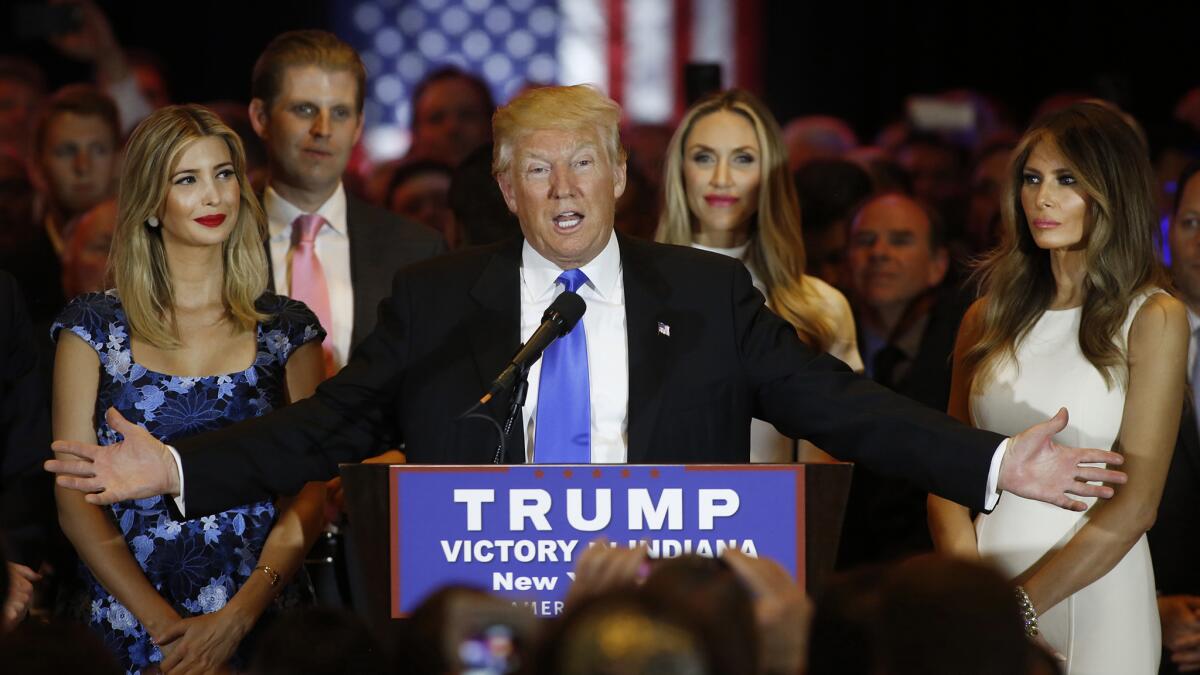In Europe, there’s a sense that Trump could actually win

- Share via
Reporting from Berlin — Many Europeans seemed surprised and in some cases stunned Wednesday over Donald Trump’s emergence as the presumptive Republican nominee for president of the United States.
The business mogul and television celebrity all but locked up the Republican nomination with his victory in the Indiana primary Tuesday that was followed by Texas Sen. Ted Cruz and then Ohio Gov. John Kasich ending their campaigns.
“Trump’s foreign policy ideas seem so diffuse and erratic,” Thorsten Hasche, a political scientist at the University of Goettingen in Germany, said in an interview. “The prevailing fear is that America would be more isolationist with a President Trump and European countries would have to do more on their own for their own defense.”
Until now, Trump was generally viewed in Europe as a peculiar and poorly qualified candidate that American voters would reject, as well as a Republican party outsider with strange ideas who had virtually no chance of becoming the nominee -- let alone the next president.
Now many apparently believe, whether they like Trump or not, that he could prove doubters wrong on both sides of the Atlantic and end up beating Democratic front runner Hillary Clinton in the November presidential election.
“What a shock – it’s Trump!” wrote the conservative Frankfurter Allgemeine Zeitung’s Klaus-Dieter Frankenberger in an online commentary.
“Anyone who thinks he’ll be easy game in the general election better wake up fast. The experts have been wrong all along in this race. People laughed at the thought of it only a half year ago but they’re now feeling a cold shiver running down their neck.”
A commentary by Lucia Graves in London’s Guardian newspaper indicated why some people find Trump’s success unbelievable.
“Donald Trump could actually be the next president – just let that sink in,” Graves wrote. “This is a man who actively demeans women, has encouraged violence at his campaign rallies, would ban all Muslims entering the US, and recently seemed undisturbed by the endorsement from the leader of the Ku Klux Klan. And yet Trump…is poised to grasp the highest office in the land.”
It is not only Trump’s talk about building a wall along the Mexican border, his demands to ban Muslims from entering the United States, his misogynistic remarks, his protectionist language or demands that European nations spend more on their own defense in the North Atlantic Treaty Organization that has the chattering classes across the continent worried.
It is a general sense that he doesn’t understand, or doesn’t want to understand, the complex world outside the United States and a prevailing feeling that he could be trigger-happy that has many on a continent scarred by many wars frightened. In January, Trump even misplaced Paris as a city in Germany in one comment on social media.
“It’s a huge shock for us because most Europeans think of America as an open, tolerant and liberal country,” Hasche said.
An opinion poll in Germany published in Bild am Sonntag in January found that 74% respondents if they could vote in the U.S. election, would cast their ballots for Clinton, while only 8% would vote for Trump.
YouGov research for Germany’s Handelsblatt newspaper two weeks ago found that Clinton led Trump by wide margins not only in Germany, but in all Group of 20 countries, the world’s largest 20 economies, except one: Russia.
In Britain, where Prime Minister David Cameron once criticized Trump’s ideas on a travel ban on Muslims as “divisive, stupid and wrong”, the Telegraph newspaper published a column by Sophy Ridge saying:
“Feminists everyone should rejoice” over Trump’s victory because “the real estate mogul is on course to smash the final glass ceiling and pave the way for a woman to become President of the United States.”
Newspapers in other countries also took note of Trump’s triumph.
Madrid’s El Pais said the businessman had left Spain “perplexed” with his uncanny winning streak.
“People in Germany and Europe look at Trump and think: what’s going on over there?” Gero Neugebauer, a political scientist at Berlin’s Free University, said in an interview. “They’re just shocked that someone with that kind of behavior could actually end up becoming president. They see a lot of risks associated with a President Trump.”
Germany’s Vice Chancellor and Economy Minister Sigmar Gabriel recently called Trump a threat to peace and prosperity. Chancellor Angela Merkel has remained mum even after Trump criticized her for “ruining Germany” in a tweet last year after she was named Time magazine’s Person of the Year for Germany’s leading role in sheltering Syrian refugees.
Germany’s Der Spiegel magazine, which once called Trump the world’s most dangerous man, said in a commentary Wednesday that Trump was “seducing” American voters with the false promise that he could make America “great” again.
Der Spiegel’s Roland Nelles, in a commentary from Washington, warned that it would be a mistake to underestimate Trump’s chances in the general election.
“Americans love winners,” he wrote. “A lot of people are saying: why not give the new guy a chance – along the lines of ‘no risk, no fun’. That’s why the next president could end up being Trump. That’s only just another prediction. And hopefully it’s wrong.”
ALSO
North Korean capital in throes of ‘70-Day Speed Battle’ to prepare for political confab
Seeking bargains, and hope, at the market swallowing Nicaragua’s capital bit by bit
In the Philippines, ‘a government with heart’ versus the rule of the fist
Kirschbaum is a special correspondent.
More to Read
Sign up for Essential California
The most important California stories and recommendations in your inbox every morning.
You may occasionally receive promotional content from the Los Angeles Times.










